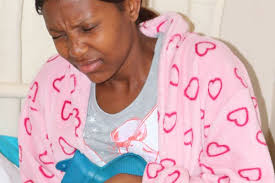Source: monitor.co.ug
Menstruation is a monthly series of changes that happen in the body of the woman in preparation for conception. An egg matures in the ovaries and is released in a process called ovulation. At the same time, the lining of the uterus, the endometrium grows to prepare for implantation. When fertilisation does not occur, this lining sheds off as menstrual blood. If there is more than seven days’ lag in your period, it is not regular.
Vanessa Namakula has for the past two years suffered extreme menstrual bleeding. The businesswoman says: “Sometimes, I do not get my period for about four months and when it comes, it is extremely heavy and lasts six days.”
Normal period
A normal period is supposed to be regular and cyclic that you are aware of when the next one will come, says Dr Ndozire Jnr, a gynaecologist at Mildmay Hospital.
He adds that a period is not supposed to be so heavy that it disrupts one’s health (80ml of blood per day). Your menstrual period should be a maximum of seven days but can last for a day or three as long as it is cyclic.
Extreme of menstruation is charaterised by variations such as heavy menstrual bleeding, painful periods, and irregular ones. Dr Ndozire advises that one goes to see a gynaecologist if they are experiencing any of these variations.
Heavy bleeding
This is when a woman loses a lot of blood or the bleeding lasts more than seven days and may cause other conditions such as anaemia. In such cases, the woman might also have blood clots.
The major causes of heavy bleeding are masses in the uterus, fibroids, polyps and using the Inter Uterine Device (IUD).
“Some women who use the IUD experience heavy bleeding, especially in the first three months but this normalises thereafter. Also, if you have missed your period for some time, the next period is likely to be heavy because the endometrial layer that sheds off is bigger,” Dr Ndozire says.
Painful bleeding
Dr Ndozire says a number of adolescent girls and those getting their period for the first time usually have a painful one. He, however, adds that this is normal if the pain is tolerable. It is known as primary dysmenorrhoea when a woman experiences cramping in the lower abdomen before or during menstruation but there is no particular cause for the pain. It is prevalent among adolescents but can also affect adults.
Dr Ndozire says secondary dysmenorrhoea is when there is a particular cause for the painful menstruation and this may be due to endometriosis, a condition where the tissue of the uterus (endometrium) grows in other places such as the fallopian tubes or ovaries. The presence of fibroids can also be another reason for painful menstrual bleeding.
Painful periods are treated with non-steroidal drugs such as ibuprofen and diclofenac while women whose menstrual pain is caused by endometriosis might need surgery to remove the ectopic endometrium.
He says: “The uterus can be removed for those women who have attained the required family size but suffer from extremely painful periods due to endometriosis. Scarring of the endometrium using electricity can also be done but here, a woman will be unable to have any more children.”
Irregular menstruation
Menstruation is a monthly cycle and an irregular period happens because you do not ovulate in some months according to Dr Charles Kiggundu, a gynaecologist at Kawempe General Hospital.
“There are conditions that may cause one not to ovulate and the commonest is polycystic ovarian syndrome. This is when a woman has a hormonal imbalance with an excess of the male hormone.
This imbalance prevents the development and release of mature eggs and without a mature egg, neither ovulation or pregnancy can occur,” Dr Kiggundu says adding that treatment depends on the cause of the problem.
Intermenstrual bleeding
Dr Charles Kiggundu, a gynaecologist at Kawempe General Hospital, says intermenstrual bleeding is when one has their normal period but bleeds in between their cycle. The bleeding may be coming from the vagina due to a polyp in the vagina or cervix, especially if the cervix is changing into a cancer.
He says, “The blood can also come from the endometrium which may be bigger than normal (hyperplasia). Also endometrial cancer can cause bleeding between periods as well as trauma such as rape.”
